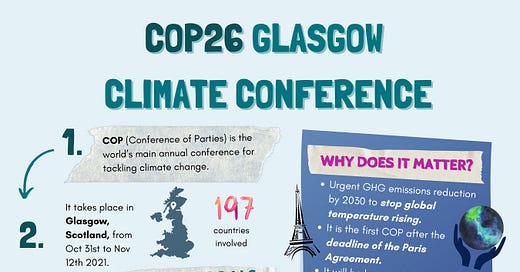WHAT DOES COP MEAN?
Established by the United Nations in 1995, COP stands for Conference of the Parties. There are 197 Parties (196 Parties and the EU), which are the signatories of the United Nations Framewoek Convention on Climate Change (UNFCCC) (UN, 2021). This year’s Conference, COP26, is the 26th COP and was hosted by the UK and took place in Glasgow from October 31st to November 12th (The Economist, 2021).
After the COP21 and Paris Agreement in 2015, COP26 is the most important Conference, in which the Parties updated their plans for reducing emissions to prevent global temperature rising 1.5 degrees (BBC, 2021).
“But that’s not all. The commitments laid out in Paris did not come close to limiting global warming to 1.5 degrees, and the window for achieving this is closing.
The decade out to 2030 will be crucial.
So as momentous as Paris was, countries must go much further than they did even at that historic summit in order to keep the hope of holding temperature rises to 1.5 alive. COP26 had to be decisive” (UN Climate Change Conference, UK 2021).
What are the goals for COP26?
According to the UN (2021), the main targets of COP are:
Secure global net zero by Mid-Century and keep 1.5 degrees within reach.
To prevent global warming above 3 degrees by 2100, each country is expected to up the ante with updated emissions reductions targets every 5 years that reflect their highest possible impact. To achieve on these targets, countries will need to accelerate everything from phasing out coal to investing in renewable energy and technologies, preserve existing forests and foster sustainable agriculture practices.
Adapt to protect communities and natural habitats
At COP26, world leaders must commit to work together and support less wealthy countries, which are the most affected by climate change as they work to protect and restore ecosystems, build defenses, establish warning systems and increase the resilience of agriculture and infrastructure.
Mobilize finance
To achieve the scale and speed of change will require global effort, such as funds from both the public and private sectors. Public finance will be needed for the development of green, climate-resilient infrastructure. And private finance will need to be mobilized to fund green technology and innovation — and to help transform billions of public dollars into trillions of total climate investment.
Work together to deliver
Climate change is a global threat, and all countries should be involved in tackling it. At COP26, attending countries will need to finalize the Paris Rulebook (the rules needed to implement the Paris Agreement) and accelerate climate action across the globe. This means that it will require collaboration across governments, businesses and civil societies.
How can we be part of the solution?
As GlocAllia, we aim to co-build and leverage sustainable development in local communities in Eastern Africa and all over the world. We aim to boost their local economies as well as improving and co-designing regenerative agriculture practices with the locals. We believe in parterships and co-creation to Planet and People Thrive.
To get more information, check out our programs DREAMS Network and Food Systems Innovation to be part of the solution!
Resources:
BBC (2021). COP26: What is it and why is it happening in Glasgow in 2021? Retrieved from: https://www.bbc.co.uk/newsround/51372486
The Economist (2021). Why the COP26 climate summit will be both crucial and dissapointing? Retrieved from: https://www.economist.com/leaders/2021/10/30/why-the-cop26-climate-summit-will-be-both-crucial-and-disappointing?gclid=Cj0KCQiAweaNBhDEARIsAJ5hwbdExnJ_o72nuc-PAa5lsfbYgw7eeqhz-jH9W1E3lyxVXTbOsvWAti8aAmn_EALw_wcB&gclsrc=aw.ds
UN (2021). What is a COP? UN Climate Change Conference UK 2021. Retrieved from: https://ukcop26.org/uk-presidency/what-is-a-cop/




